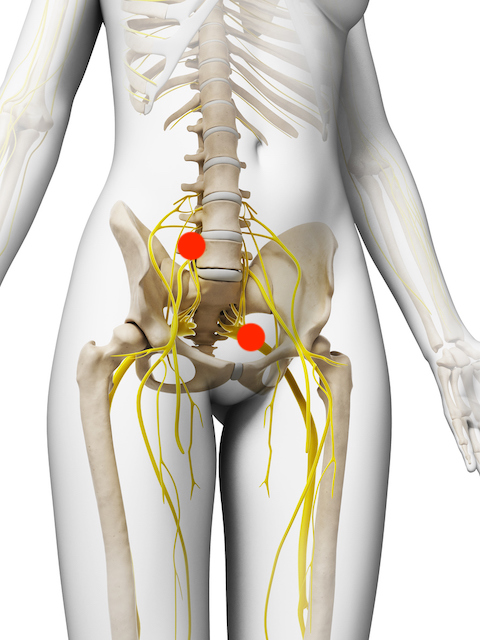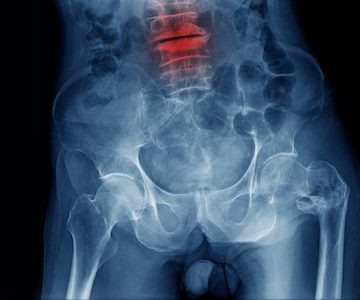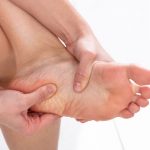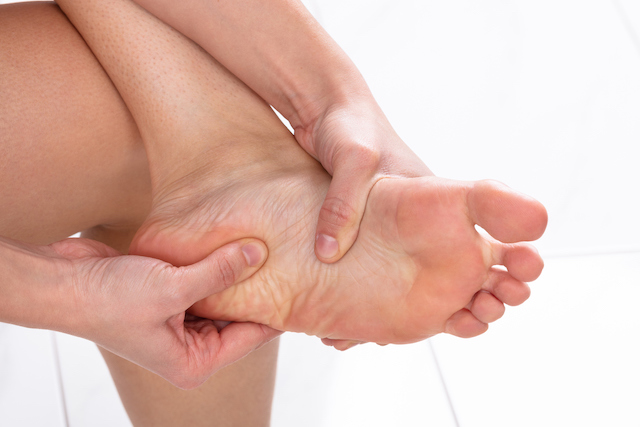Estimated reading time: 5 minutes
Are numbness and tingling in your feet and legs interfering with your daily life? Maybe these sensations strike after sitting for long periods or standing for a while. If this sounds familiar, a pinched nerve causing numbness and tingling in your feet and legs may be to blame. Understanding the underlying cause can help you find the right relief, so read on to learn more.
Common Causes of Numbness and Tingling in Feet and Legs

One of the most common causes of numbness and tingling in the feet and legs is a pinched nerve in the lower back or buttock area. Nerves that travel from the brain down the spinal cord and through the lower back are responsible for sensation in the legs and feet. When compressed or pinched by bones or surrounding soft tissues, they may cause symptoms such as numbness, tingling, or even weakness.
Pinpointing the source of your symptoms is essential for effective treatment. Once the pinched nerve is located, targeted therapies can relieve pressure on the nerve and ease discomfort. Working with a specialist such as a chiropractor, trained in nerve health, can make this process easier and more effective.
Signs of a Pinched Nerve Causing Numbness and Tingling in Your Feet and Legs
If a pinched nerve in the lower back is behind the numbness and tingling in your legs and feet, you may notice specific patterns:
- Increased numbness or tingling when bending forward or backward: Movements like bending to tie your shoes or leaning back may worsen symptoms, especially if they involve your lower back.
- Prolonged sitting or standing triggers symptoms: Extended periods in one position, whether seated at a desk or standing, can put pressure on the nerve, leading to numbness and tingling.
- Symptoms when raising the affected leg: Lying on your back and lifting the affected leg straight (keeping the knee unbent) can also increase numbness and tingling.
These common indicators often point to a pinched nerve causing numbness and tingling in your feet and legs, stemming from your lower back.
Could a Muscle in the Buttocks Be the Problem?
While pinched nerves in the spine are a frequent cause of numbness and tingling, other issues like tight muscles can also contribute to similar symptoms. The piriformis muscle, located deep in the buttocks, can put pressure on the sciatic nerve if it becomes tense. To check if this might be your issue, try the following:
- Rotating the affected leg inward while lying down: If this movement leads to numbness or tingling, a tight muscle may be pressing on the nerve.
- Bringing your knee toward your chest and across to the other side: If this position causes symptoms, it could be due to a muscle rather than a spinal nerve issue.
Chiropractors are trained in muscle and nerve health. They can evaluate the source of your symptoms and provide therapies or referrals as needed to relieve muscle tension.
How Chiropractic Care Helps Relieve Pinched Nerve-Related Symptoms

Chiropractors specialize in diagnosing and treating pinched nerve issues. So they can determine whether the numbness and tingling in your feet and legs stem from a spinal nerve or tight muscles. A thorough chiropractic exam may involve testing for numbness, tingling, or weakness and often includes imaging like X-rays to assess disc health and spinal alignment.
If the examination reveals spinal misalignments or signs of degenerative disc disease, your chiropractor can adjust the spine to relieve pressure on the nerves. Chiropractic adjustments, often combined with muscle relaxation techniques, work to restore mobility, reduce nerve irritation, and alleviate discomfort.
Other Possible Causes of Numbness and Tingling in Legs and Feet
While a pinched nerve is often the culprit, other conditions can also cause similar symptoms, such as diabetes, vascular problems, multiple sclerosis, vitamin B12 deficiency, or even tumors. A thorough exam is essential to rule out these potential causes and ensure you receive the appropriate care.
Finding Relief from Numbness and Tingling
The numbness and tingling in your feet and legs don’t have to disrupt your life any longer. Chiropractic care offers a non-invasive, effective solution to relieve pinched nerves and restore comfort, allowing you to focus on the activities that matter to you. Reach out to a trusted chiropractor today, and take the first step toward improved well-being and a more active lifestyle.
For a healthy spine and nervous system, contact Edmonton chiropractor Dr. Dean Collins. Or book a consult and exam with him today.
To learn more about how chiropractor care can help you and your family, read Dr. Collins’ comprehensive guide to chiropractic care: Chiropractic Care for Everyone.
Sign up for our Dr. Collins’ newsletters and blog posts
Sign up Dr. Collins’ newsletters to receive vital information on how to keep your spine and nervous system healthy as well as how to help optimize your health and avoid chronic illness.




To resolve a pitched nerve of 30 years on the left side of by back (my whole leg ‘goes to sleep and won’t support weight ), what would help a surgeon or Chiropractor ‘see’ the constriction’? Would that be x-ray, MRI, … etc? What muscles would a physical therapist strengthen? ( Mine ‘comes and goes’ ,usually from lifting heavy objects. At age 30 I injured it at work (while in perfect health. I am 2 meters tall. I am now 63. pain pills help, but they are increasingly hard to get prescribed, and yes, that does seem punitive. I am regularly ‘urine tested’ regularly and not once in 30+ years have they found and substance that was not prescribed. Right now I can’t walk. Advice? I live in the US, zip code 19018 (outside of Philadelphia PA)
Hi John, I would see a chiropractor first. If they do a thorough history and exam (probably an x-ray to start with) they should be able to determine if they can help you or not. As well, to determine if it’s safe to treat you. Sorry I do not know any chiropractors in the Philadelphia area to refer you to. If you can get an MRI, for sure, that is better imaging than an x-ray as it will show if the nerves are pinched (compressed) and what is compressing the nerves (like a disc bulge or herniation). And if you get a good physical therapist, they would be able to help target which muscles need to be strengthened. Good luck to you.
Dr. Collins
I have had an MRI and it shows I have 2 bulging discs, osteoarthritis and pinched nerves at the L5 & S1. The specialist has said I need surgery but can this be cured by a Chiropractor ?
Hi Janelle, I would suggest you go see a chiropractor (preferably a referral from someone) to get a thorough history and exam done. From there, the chiropractor and you can sit down and discuss if getting chiropractic care would be a viable option for you. Chiropractors often see patients come in often with bulging discs, osteoarthritis, and pinched nerves. More often than not, these patients have successful outcomes with chiropractic care. And once in a while, chiropractic care doesn’t work. In these cases, sometimes physiotherapy and/or acupuncture might be an option. If all conservative measures have been exhausted, surgery might be necessary. Hope this helps you and good luck! – Dr. Collins